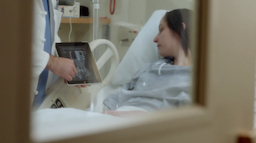 Collecting patient histories on iPads has reduced physician documentation time by 17 percent at Duke University oncology clinics and has led to more productive exams and consultations, according to the head of a major management consulting firm.
Collecting patient histories on iPads has reduced physician documentation time by 17 percent at Duke University oncology clinics and has led to more productive exams and consultations, according to the head of a major management consulting firm.
Writing for the Economist Group's Lean Back 2.0 column, Boston Consulting Group Managing Director Paul Zwillenberg describes how Apple's iconic tablet, at least anecdotally, has improved cancer care at his alma mater.
"Now, each time patients visit a Duke Oncology clinic, they answer a series of 88 questions on tablet computers in the waiting room. Between visits, they regularly make similar observations on a secure online site," Zwillenberg reports.
While the online follow-up acts as a supplement to traditional office visits, the questionnaire makes face-to-face encounters more productive, too. Zwillenberg says Duke clinicians find that this electronic history form produces information that often is more "accurate and comprehensive" than what physicians can obtain during an actual exam or consultation.
"Three-quarters of breast-cancer patients reported that they were able to remember their symptoms more accurately, and one-third of them said the online questionnaire prompted them to bring up issues with their doctors," he adds. "Patients are also more forthcoming about alcohol use, sex lives, anxiety and depression on the tablets than they are in person."
And this is with an adult population with an average age of 54, not exactly what Zwillenberg labels the "always-on, multitasking, multiplatform, millennial, social-media set accustomed to an open-door policy about their lives."
Zwillenberg reports that information gleaned from the tablet-based questionnaire helped Duke oncologists identify a pattern of sexual distress among patients with gastrointestinal or breast cancer. The university subsequently created educational materials and counseling programs for these populations.
"Combining tablet technology with clinical care has been great for our doctors and our patients. Tablets enable doctors to spend more time with patients, and patients to lead fuller lives through the creation of personalized education," Dr. Amy Abernethy, founder and director of the Duke Cancer Care Research Program, tells Zwillenberg.
















